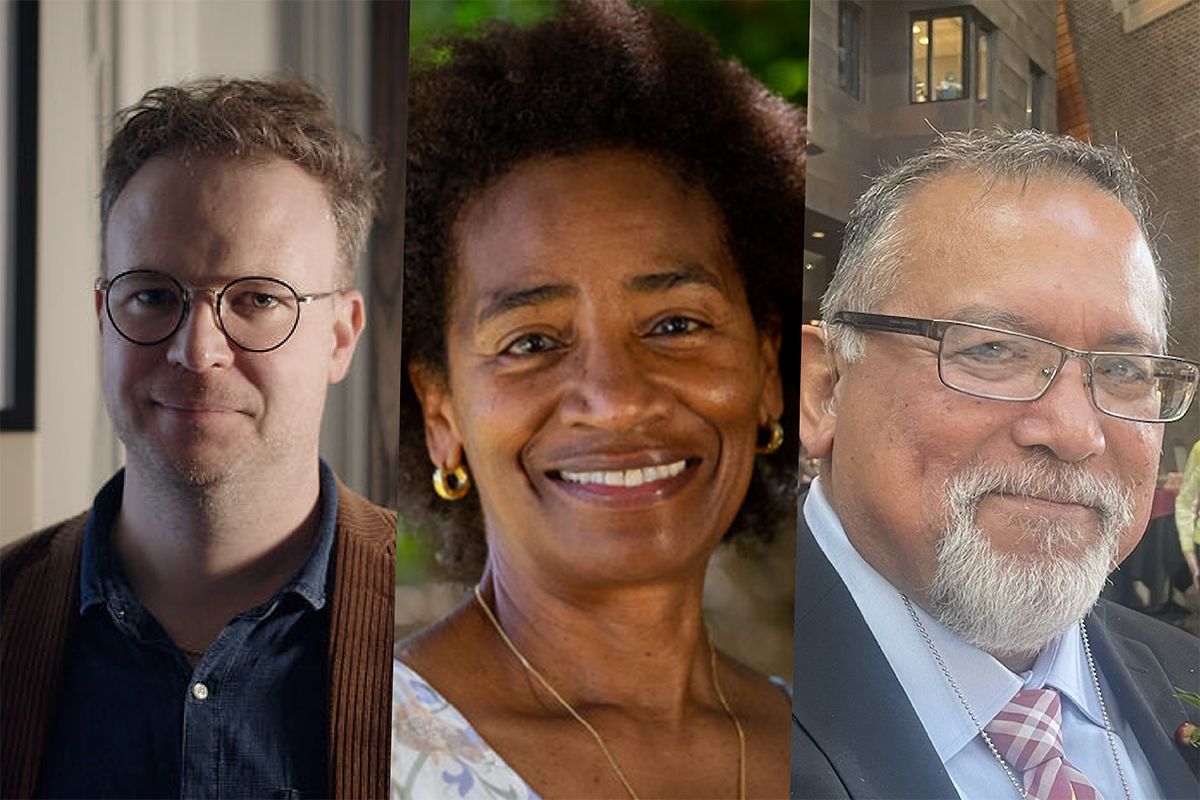Recognizing the 2025 UCLA College Commencement faculty marshals

composite by Katie Sipek/UCLA
From left to right, this year’s UCLA College faculty marshals are David Russell, Marilyn Raphael and Vicente Diaz
Kayla McCormack | June 6, 2025
UCLA College faculty marshals formally begin each commencement ceremony by leading the official party procession. Serving in this capacity is a position of honor that reflects the remarkable contributions these faculty have made to the UCLA community via their impressive scholarship and service. Nominated and selected by the five deans of the UCLA College, these faculty marshals epitomize the exceptional ideals and impact of the College.
Please join us in congratulating this year’s distinguished UCLA College faculty marshals.
11 A.M. CEREMONY
David Russell
“It is good to love the unknown.”
David Russell joined UCLA in 2023 as associate professor of English. He was previously associate professor of English at the University of Oxford and lecturer in 19th-century literature at King’s College London. He has held fellowships at Columbia University’s Society of Fellows in the Humanities and Harvard University’s Mahindra Humanities Center.
Russell’s research focuses on literature, psychoanalysis and the visual arts. His first book, “Tact,” explores how the essay became a vehicle for navigating modern social life in 19th-century Britain.
His second book, “Marion Milner: On Creativity,” examines the visual and literary work of the 20th-century psychoanalyst and artist to explore creativity’s role in mental health.
His current project focuses on John Ruskin’s interplay of word and image, and how his writing on art’s destruction speaks to modern concerns with environmental collapse.
At UCLA, Russell teaches courses on 19th-century literature, psychoanalysis, queer theory, critical prose and interdisciplinary approaches to art and culture.
3 P.M. CEREMONY
Marilyn Raphael
“Live with an eye to what you could achieve, rather than what you fear. Each misstep is an opportunity to learn and become stronger. Above all, be kind.”
Marilyn Raphael is a professor of geography at UCLA and previous director of the UCLA Institute of the Environment and Sustainability. She served as chair of the department of geography from 2010 to 2013. Her primary research focus is on the dynamics of the Southern Hemisphere atmospheric circulation and Antarctic sea‑ice variability. Her major scientific goals are to characterize the Antarctic sea ice variability and to define and understand the interaction between Antarctic sea ice and the large-scale Southern Hemisphere atmospheric circulation, focusing on interaction at the seasonal, interannual and decadal time scales. Her work includes global climate modeling with an emphasis on improving the simulation of sea ice and the atmosphere in the Southern Hemisphere.
She is a member of the National Academy of Sciences as well as the American Academy of Arts and Sciences and also serves as chair of the Scientific Committee on Antarctic Research’s expert group on Antarctic Sea Ice Processes and Climate. Raphael has served on the National Research Council’s Committees on Future Science Opportunities in Antarctica and the Southern Ocean and Stabilization Targets for Atmospheric Greenhouse Gas Concentrations.
7 P.M. CEREMONY
Vicente Diaz
“‘No man is an island,’ John Donne wrote in 1624. ‘No island was ever an island to begin with,’ say Pacific Islander navigators, who have known this for thousands of years.”
Vicente Diaz, originally from Guam, with lineage to Pohnpei Island in Micronesia and to the Philippines, is a professor in UCLA’s Department of American Indian Studies and serves as the associate director for engagement at UCLA’s American Indian Studies Center. Diaz has held tenured positions in history, anthropology, American Indian studies, ethnic studies and American studies at institutions including the University of Guam, University of Michigan, University of Illinois Urbana-Champaign and University of Minnesota-Twin Cities.
Diaz’s work is primarily situated in the emergent field of critical and comparative Indigenous studies in North America and the Pacific Ocean region. His research and teachings are focused on topics including: Indigenous canoe culture revitalization; sports and Indigeneity; traditional outrigger canoe voyaging in Micronesia; colonialism and Indigenous Christianity in Micronesia; and Pacific history, film and video.
He is the founder and director of The Native Canoe Program, which integrates traditional watercraft, Indigenous ecological knowledge, and virtual and augmented reality technologies to support community-engaged scholarship and Indigenous nation-building.
He holds a Ph.D. in the history of consciousness from the University of California, Santa Cruz, and M.A. and B.A. degrees in political science from the University of Hawaiʻi at Mānoa.




